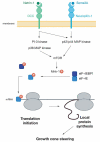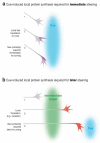RNA translation in axons
- PMID: 15473850
- PMCID: PMC3682640
- DOI: 10.1146/annurev.cellbio.20.010403.111746
RNA translation in axons
Abstract
The cell body has classically been considered the exclusive source of axonal proteins. However, significant evidence has accumulated recently to support the view that protein synthesis can occur in axons themselves, remote from the cell body. Indeed, local translation in axons may be integral to aspects of synaptogenesis, long-term facilitation, and memory storage in invertebrate axons, and for growth cone navigation in response to environmental stimuli in developing vertebrate axons. Here we review the evidence supporting mRNA translation in axons and discuss the potential roles that local protein synthesis may play during development and subsequent neuronal function. We advance the view that local translation provides a rapid supply of nascent proteins in restricted axonal compartments that can potentially underlie long-term responses to transient stimuli.
Figures



References
-
- Alvarez J, Giuditta A, Koenig E. Protein synthesis in axons and terminals: significance for maintenance, plasticity and regulation of phenotype. With a critique of slow transport theory. Prog. Neurobiol. 2000;62:1–62. - PubMed
-
- Antar LN, Bassell GJ. Sunrise at the synapse: the FMRP mRNP shaping the synaptic interface. Neuron. 2003;37:555–58. - PubMed
-
- Aronov S, Aranda G, Behar L, Ginzburg I. Visualization of translated tau protein in the axons of neuronal P19 cells and characterization of tau RNP granules. J. Cell Sci. 2002;115:3817–27. - PubMed
-
- Bassell GJ, Singer RH, Kosik KS. Association of poly(A) mRNA with microtubules in cultured neurons. Neuron. 1994;12:571–82. - PubMed
Publication types
MeSH terms
Substances
Grants and funding
LinkOut - more resources
Full Text Sources

